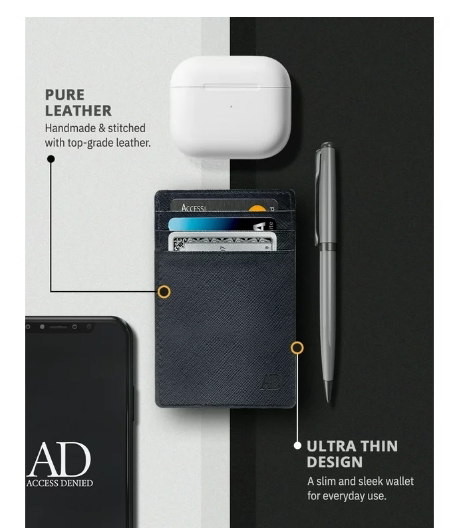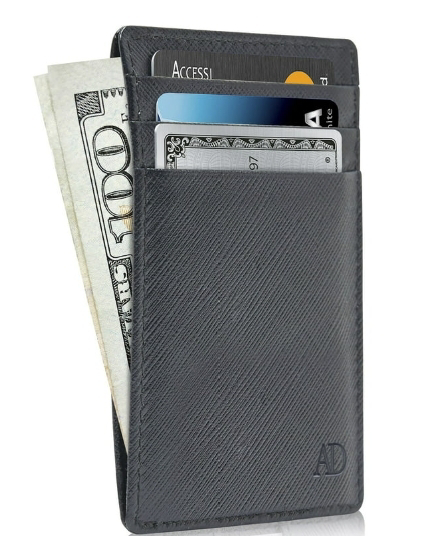Wallets have been used for centuries to carry personal items such as paper currency, coins, identification documents, and other small items. The history of wallets dates back to ancient times when people used drawstring leather pouches tied to waist belts to store coins. Wallets were also used to carry dried meat, victuals, treasures, and other items that were not to be exposed.
In the 1600s, Renaissance wallets were developed after the introduction of paper currency to the West. Early wallets were made primarily of cow or horse leather and included a small pouch for printed calling cards. In the 19th century, carrying a wallet on one's belt was considered "semi-civilized," and carrying goods or a wallet in one's pocket was considered uncivilized and uncommon.
The modern bi-fold wallet with multiple "card slots" became standardized in the early 1950s with the introduction of the first credit cards. Wallet design and style continued to evolve after the war, with bi-fold wallets with card slots becoming standardized in the 1950s. The 1950s also saw the introduction of a variety of colors and exotic leathers, which added to the fashion side of the design equation.
In the 1970s, there was a return to simpler wallets, followed by the dark colors, chains, and alternative textiles introduced throughout the punk movements of the 80s and 90s. The 90s also saw the introduction of the velcro wallet. As currency and payment methods changed over time, so did wallets, and they continue to change. In our current day, the introduction of electronic wallets on our smartphones has reduced the number of cards we carry, leading to the growing popularity of minimalist wallets.
A minimalist wallet is a slim and compact wallet that is designed to carry only the essentials. It has become increasingly popular in recent years due to its many benefits. Here are the key advantages of using a minimalist wallet:
Organization: A minimalist wallet ensures that you have to deal with fewer items in your wallet, thereby helping everything stay organized. Putting things back in their place will not be a hassle because of fewer items. Additionally, you cannot shove anything you want, anywhere you want inside a minimalist wallet, which helps to keep everything in order.
Security: Carrying many credit and debit cards with you can be a considerable risk. A minimalist wallet is more efficient because it focuses on one primary payment method and an alternate just in case you should lose the main form of payment, making it less of a gold mine for a thief to steal. This reduces the potential loss if your wallet is compromised, making it a more secure option.
Efficiency: With a slim, well-made wallet, you can pay for goods faster. Many minimalist wallets come with lanyards or easy-access designs, making it effortless to retrieve your wallet, even when seated or in a hurry. This makes transactions smoother and more convenient.
Durability: Minimalist wallets are often made of high-quality materials that are built to last. They can withstand daily wear and tear, ensuring longevity and reliability. This makes them a more durable option than traditional wallets.
Style: Minimalist wallets have a sleek and minimalist design that adds a touch of sophistication to your everyday carry. They come in various colors and materials, allowing you to choose one that matches your personal style. This makes them a stylish accessory that complements any outfit.
Health Benefits: Slimming down your wallet can have health benefits. Bulky wallets can cause discomfort and even back problems when sitting for extended periods. A minimalist wallet eliminates this issue, providing a more comfortable and ergonomic solution.
In summary, using a minimalist wallet offers benefits such as organization, security, efficiency, durability, style, and potential health benefits. These advantages make minimalist wallets a practical and popular choice for individuals seeking a more streamlined and functional wallet solution.
When it comes to the best minimalist wallet brands, there are several options to consider. Here are some of the top brands that consistently receive positive reviews:
1. Bellroy: Bellroy is often regarded as one of the best brands for minimalist wallets. Their Hide and Seek Wallet is highly recommended for its sleek design, quality craftsmanship, and functionality.
2. Ridge Wallet: The Ridge Wallet is another popular brand known for its minimalist and durable designs. It features a metal frame and offers RFID-blocking capabilities
3. Dango: Dango is a brand that offers minimalist wallets with a tactical twist. Their T01 Tactical Wallet is designed to be rugged and versatile, featuring a multi-tool function
4. CountyComm: CountyComm is known for its minimalist wallets that offer great value for money. Their Woven Dyneema Card Holder is a budget-friendly option that provides simplicity and durability
5. WP Standard: WP Standard offers slim and stylish wallets made from high-quality leather. Their Slim Wallet is praised for its functionality and timeless design
6. Alpaka: Alpaka is a brand that specializes in technical and functional minimalist wallets. Their X50 Zip Pouch is a versatile option that offers secure storage for cards and cash
7. Tanner Goods: Tanner Goods is known for its premium leather goods, including minimalist wallets. Their Journeyman Wallet is highly regarded for its craftsmanship and durability.
These are just a few examples of the best minimalist wallet brands available. Ultimately, the best brand for you will depend on your personal preferences, budget, and desired features. It's recommended to read reviews and consider the specific features and materials that suit your needs before making a purchase decision.






